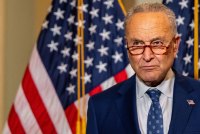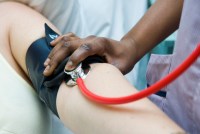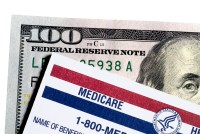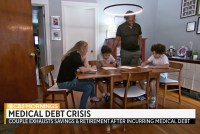Latest Morning Briefing Stories
In America, Cancer Patients Endure Debt on Top of Disease
Medical breakthroughs mean cancer is less likely to kill, but survival can come at an extraordinary cost as patients drain savings, declare bankruptcy, or lose their homes, a KHN-NPR investigation finds.
Seeking to Kick-Start Biden’s Agenda, Schumer Unveils a Bill for Medicare Drug Price Negotiations
In addition to allowing federal officials to negotiate the price that Medicare pays for some drugs, the bill would cap annual out-of-pocket drug costs for Medicare beneficiaries at $2,000. But before Democrats can pass the bill under special rules that prevent Republicans from staging a filibuster, they must get approval from the Senate parliamentarian.
‘Free’ Screening? Know Your Rights to Get No-Cost Care
Even a decade in, the Affordable Care Act’s recommendations to simply cover preventive screening and care without cost sharing remain confusing and complex.
Cómo evitar, o deshacerse, de una deuda médica
Más de 100 millones de personas en el país, con o sin seguro de salud, tienen deudas médicas. Saber navegar un complejo sistema de facturación y “trampas” puede ayudar a saldarlas sin caer en bancarrota, o evitarlas.
How Much Health Insurers Pay for Almost Everything Is About to Go Public
New government rules force health insurers to publicly disclose what they pay for just about every service. That information could help consumers and employers know whether they’re getting a fair deal.
How to Get Rid of Medical Debt — Or Avoid It in the First Place
Medical bills can add stress to the already stressful experience of dealing with a medical crisis. And if you can’t pay those bills, they can linger, wreaking havoc on your financial goals and credit. Here’s how to protect yourself.
Government Watchdogs Attack Medicare Advantage for Denying Care and Overcharging
The Government Accountability Office and the Health and Human Services inspector general’s office say seniors enrolled in the program are suffering and taxpayers are getting bilked for billions of dollars a year.
‘American Diagnosis’: Indigenous Advocates Work for Better Reproductive Care
From forced sterilizations in the 1960s to scant access to abortion care today, barriers to health care threaten Native people’s reproductive autonomy. Episode 7 explores efforts to protect and expand Native Americans’ access to comprehensive reproductive and sexual health care.
Listen: He Was Denied Care Because He Owed His Doctor Less Than $100
NPR’s “Morning Edition” and “All Things Considered” interview KHN’s Noam N. Levey about the problem of crippling medical debt in America.
His-and-Hers Cataract Surgeries, But His Bill Was 20 Times as Much
Whether a simple operation is performed under the auspices of a hospital or at an independent surgery center can make a huge difference in cost.
Journalists Investigate Private Equity, Medical Debt, and Mental Health Care
KHN and California Healthline staff made the rounds on national and local media this week to discuss their stories. Here’s a collection of their appearances.
Readers and Tweeters Weigh In on Medical Debt, the Obesity Epidemic, and Opioid Battles
KHN gives readers a chance to comment on a recent batch of stories.
KHN’s ‘What the Health?’: The FDA Goes After Nicotine
The FDA is using its power to regulate tobacco products — ordering the vaping device Juul off the market and announcing its intention to lower the amount of nicotine in cigarettes and other products. Meanwhile, the Supreme Court rules on Medicare and kidney dialysis, and Congress makes progress on legislation surrounding guns and mental health. Joanne Kenen of the Johns Hopkins Bloomberg School of Public Health and Politico, and Rachel Cohrs of Stat join KHN’s Julie Rovner to discuss these issues and more. Also this week, Rovner interviews KHN’s Noam N. Levey about the new KHN-NPR project on the growing impact of medical debt.
Pesa el legado de Trump, mientras Colorado busca zanjar la brecha del seguro de salud hispano
A nivel nacional y en Colorado, la proporción de personas sin seguro médico ha sido durante mucho tiempo significativamente más alta entre los hispanos que entre los residentes blancos, negros o asiáticos no hispanos.
Trump’s Legacy Looms Large as Colorado Aims to Close the Hispanic Insurance Gap
Hispanic residents have long been among the least likely to have health insurance — in Colorado and across the country — in part because of unauthorized immigrants. The state is expanding coverage to some of them, although the change runs up against lingering fears about the use of public benefits.
Watch: She Almost Died. The $250K Debt Took Their House.
CBS Evening News spotlights Jim and Cindy Powers, who faced crippling medical debt.
Medical Bills Can Shatter Lives. North Carolina May Act to ‘De-Weaponize’ That Debt.
Medical debt is most prevalent in the Southeast, where states have not expanded Medicaid and have few consumer protection laws. Now, North Carolina is considering two bills that could change that, making the state a leader in protecting patients from high medical bills.
Medi-Cal Will Cover Doulas at More Than Twice California’s Initial Proposed Rate
Under a budget passed by California lawmakers, the state will pay nonmedical workers who assist in pregnancy and labor up to $1,154 per birth through Medi-Cal, which is up significantly from Gov. Gavin Newsom’s initial offer of $450. Though it’s more than what most other states pay, many doulas say it falls short of the $3,600 they sought.
Journalists Dig Deep on Medical Debt and the Boundaries of AI in Health Care
KHN and California Healthline staff made the rounds on national and local media this week to discuss their stories. Here’s a collection of their appearances.
Watch: Still Paying Off Bills From Twins’ Birth. The Kids Are 10 Now.
Marcus and Allyson Ward explain to “CBS Mornings” how the premature birth of their twins left them with $80,000 in medical debt. A new KHN-NPR investigation reveals they are among 100 million people afflicted financially by the U.S. health system.























